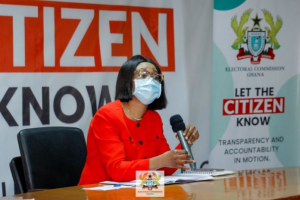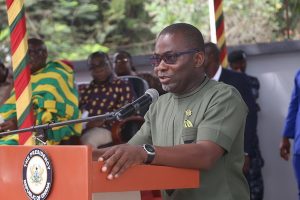The first accused person at the centre of the kidnapping and subsequent murder of four girls in Takoradi in the Western Region in 2018 and 2019, yesterday opened his defence at the Sekondi High Court.
Samuel Udoetuk Wills and John Oji, both Nigerians, are being tried in connection with the missing girls which has generated heated public debate for about two years.
The victims—Ruth Quayson, Priscilla Blessing Bentum, Priscilla Koranchie and Ruth Abekah—were believed to have been kidnapped between August 2018 and January 2019, and the police subsequently said some skeletal remains they found in Takoradi were that of the girls.
1st Accused
Udoetuk Wills led in evidence by his lawyer, George Essiful-Ansah, admitted in his evidence-in-chief that he knew two of the girls.
He mentioned the two girls as Ms. Bentum and Ms. Koranchie.
He said he knew Ms. Bentum since 2017 and that they first met at the Methodist Church, Effiakuma near Takoradi.
He added that he met Ms. Koranchie around Phastor Limited in Takoradi in 2018 and that they were all “casual” friends.
He told the court he was “shocked” when he heard that the girls had been kidnapped.
According to him, he heard about the case when he was in Koforidua in the Eastern Region and that it was his girlfriend, Emily Alimo, who called him on phone to inform him.
He said Ms. Alimo told him about the kidnapped girls and said his name had been mentioned as the perpetrator.
The accused person said he quickly arranged and came back to Takoradi but was later arrested at a friend’s house on December 27, 2018.
He also told the court that the second accused person, Mr. Oji, was his childhood friend but denied that he conspired with him to kidnap the girls.
When asked by his counsel why he mentioned the name of the second accused as being involved in the case, he told the court that he was “tortured” by the security personnel and wanted the “torture” to stop.
When asked whether he knew Ms. Alimo, who was a witness in the case, Mr. Wills said she was her girlfriend for three years.
In Chains
After the judge had ordered the lawyers for the accused persons to open their defence, the first accused person’s counsel drew the attention of the judge on what he had observed about his client in the courtroom.
He said he could see that the first accused person had bruises all over his body and also had chains around his legs and said he did not understand why his client should be in chains in the court room.
The trial judge indicated that his attention was not drawn to the situation and told the two accused persons who were standing, to sit down.
Officer’s Explanation
The judge then called on the prison officers to explain why Mr. Wills was chained while in court.
A prison officer explained that the accused person was refusing to be in court so the prison officers had to send the second accused person to court first before going in for the first accused.
He said Mr. Wills was not cooperating when he was asked to get into the bus for court so the officers had to chain his legs and handcuffed his hands before he was overpowered.
However, before he was led in evidence by his lawyer as they opened their defence, the judge ordered that the chain be removed.
No Case Dismissed
Before the first accused opened his defence, the court dismissed a submission of no case application filed by the lawyer for Mr. Oji.
The cross examination of the last prosecution witness in the Takoradi missing girls’ case came to an end somewhere in November last year and Mr. Oji indicated to the court that he had no case to answer and was filing an application.
Giving the ruling, which lasted for about one and half hours, Justice Richard Adjei-Frimpong, indicated among other things that it was satisfied that sufficient evidence had been adduced by the prosecution for the second accused person to open his defence.
He then rejected the submission of no case by the lawyer for the second accused person and ordered that Mr. Wills opened his defence to be followed by Mr. Oji.







